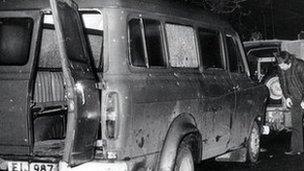Kingsmills families demand full inquiry into massacre
- Published

The bullet-riddled minibus in which 10 Protestant workmen were massacred
The families of the 10 workmen shot dead in what became known as the Kingsmills Massacre have called for a public inquiry into the killings.
The Historical Enquiries Team (HET) published the findings of their investigation on Tuesday.
The families of those killed received the report last week. They said it confirmed what they already believed.
It found that the IRA was responsible for the atrocity and that victims were targeted because of their religion.
Part of the investigation centres on claims that guns used that night may be linked to as many as 90 other murders and attempted murders.
Karen Armstrong, whose brother John McConville, 20, was one of those to die at Kingsmills said the surviving families would expect nothing less than a full inquiry into mistakes by the authorities, including the government.
She said that would alleviate "the belief these men were merely sacrificial lambs in the dirty war".
Survivor Alan Black was shot 18 times. He said the memory would "never leave him".
"There is a memorial to the men in the village of Bessbrook, close to where I live, and I think often of my work mates who lost their lives on that terrible evening," he said.
"I have suffered physical and mental scars but the families of the men who died have suffered much more.
"Their grief continues every day and I hope they will find some comfort in the HET report."
On 5 January 1976, the 10 textile workers were travelling home from work in the dark and rain on a minibus in the heart of rural County Armagh.
Just after the van cleared the rise of a hill, there was a man standing in the road flashing a torch.
They stopped and there was the sudden, ominous movement of 11 other men, all armed, emerging from the hedges around them.
Their first thought was that it was the Army, but the gunmen were masked.
A man asked their religions. There was only one Catholic left on the bus. He was identified and ordered away from his Protestant work mates. He was able to run off.
The lead gunman spoke one other word - "Right" - and the shooting began.
Mr Black was the only one to survive.
After the initial screams, he recalled years later: "There was silence. I was semi-conscious and passed out several times with the deadly pain and cold.
"I must have been lying at the roadside waiting on the ambulance for up to 30 minutes. It was like an eternity.
"When help arrived I could not get the words out quick enough. I was afraid I'd die and nobody would ever know what happened.
"I was hysterical and wanted to tell everyone - the ambulance men, nurses, doctors, police."
Bessbrook, a small, Quaker model village that because of the Troubles hosted a massive Army base, was devastated. Nine of the men lived in Bessbrook. They had 14 children.
The van driver, Robert Walker, came from near Glenanne.
The IRA never admitted involvement and was supposed to be on ceasefire at the time.
The South Armagh Republican Action Force claimed the deaths. The HET reinvestigated the killings as part of work spanning three decades of conflict.